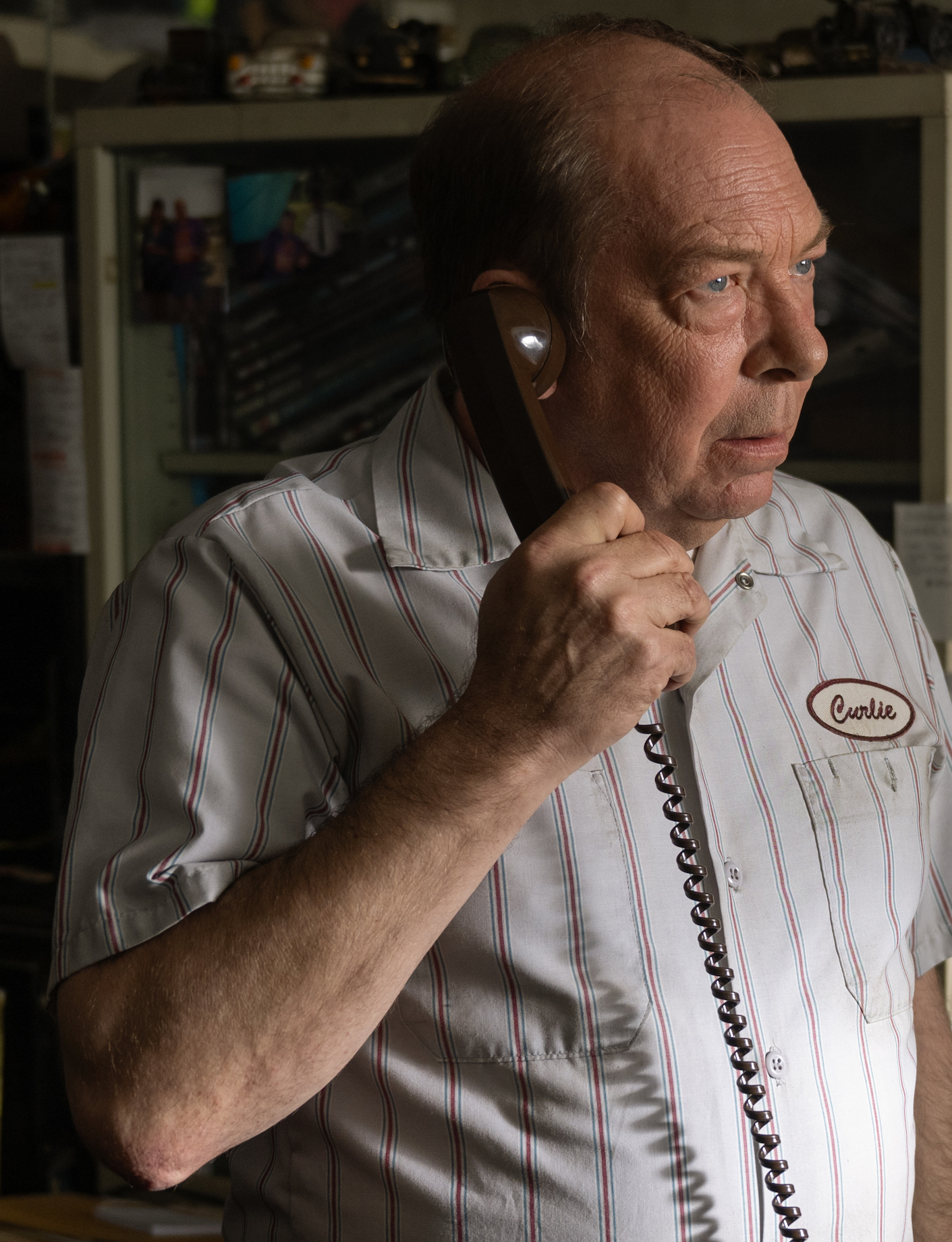There’s a Coen brother directing, plus a cast that includes Matt Damon, Pedro Pascal, Oscar nominee Colman Domingo and Margaret Qualley, the standout hitchhiker in Once Upon a Time in Hollywood… so why does Drive-Away Dolls feel so insubstantial?
Ethan Coen has co-written the script with his usual editor, also his (gay) wife, Tricia Cooke, and the talent has duly signed on. But even they can’t provide enough ballast. It’s a film of sporadically funny moments that strain to be bad-ass.
The first such moment comes in the opening scene, a Philadelphia bar in 1999, where a jittery well dressed man (Pascal, pictured below right) with a hard-shell metallic briefcase is nursing a glass of wine. He is alone there, barring a sneery barman, apparently waiting for someone who is late. The scene explodes in a flurry of cartoon violence, and the bait is cast.
 Cut to a scene of two women having very noisy sex, which is interrupted by an answer-machine message from somebody serious-sounding called Marian. The machine’s outgoing message tells us the flat belongs to Jamie and Sukie. The woman administering oral sex turns out to be Jamie (Qualley), a Texan motormouth, but the woman in the bed is not Sukie. Who turns out to be the estimable Beanie Feldstein, a force-10 cop who can turn big tough guys in the cells into quivering lumps of jelly.
Cut to a scene of two women having very noisy sex, which is interrupted by an answer-machine message from somebody serious-sounding called Marian. The machine’s outgoing message tells us the flat belongs to Jamie and Sukie. The woman administering oral sex turns out to be Jamie (Qualley), a Texan motormouth, but the woman in the bed is not Sukie. Who turns out to be the estimable Beanie Feldstein, a force-10 cop who can turn big tough guys in the cells into quivering lumps of jelly.
To escape the volcanic wrath of Sukie and her perpetually barking little dog, Alice (whose other names are B and Toklas), Jamie decides to skip town for her aunt’s place in Tallahassee, Florida. She persuades prim Marian (Geraldine Viswanathan) to join her, and the two head to a downbeat drive-away office to pick up a free car for the trip. There they encounter office manager Curlie (another effortlessly weighty cameo from Bill Camp, pictured below left, one of America’s unsung acting heroes), a man humorously immune to Jamie’s chatter. No sooner has he despatched the women to Florida with a package to deliver there than the thugs who were the car’s intended drivers show up.
Thus is triggered a pursuit through the Southern states to northern Florida, taking in the few lesbian bars Jamie can find en route; she picks up women in them while Marian reads Henry James in the motel lobby. When the pair cross paths with a whole women’s soccer team of “committed lesbians”, Jamie and Marian are thrown together in a game of musical snogging, where the team captain blows a whistle and yells “Rotate right!” The kiss proves an eye-opener for them both.
Now the familiar Coen vehicle of slapstick violence attempts to change gears. Will the thugs reach the women before they explore their new romantic possibilities? It’s become a two-track race, Bambi vs Godzilla, a romcom with thugs and guns. The squabbling thugs, losing their way, end up in a hilarious juke-joint deep in the bayou, while their boss (Domingo) – who, like Marian, shows his calibre by reading Henry James for pleasure – decides to take charge in person. Sukie, too, sets out (sensibly, by plane), aiming to deliver yapping Alice to Jamie, the only one in this entire group with a resourceful brain.
Throughout the first two thirds of the film we also have to fathom where sudden extended bursts of psychedelia are coming from, which increasingly feature a woman with long hair (Miley Cyrus) apparently seducing a man with long hair and the features of the young Matt Damon. He, whom we have seen on the roadside hoardings, is now a Florida senator elected on a family values ticket. Who the woman is becomes clearer after Jamie and Marian have a puncture, discover the briefcase in the boot and open it.
 The film can’t quite marry all these disparate elements. It doesn’t give itself enough time to establish who Jamie is beyond some sketched-in details, though in Marian’s case does offer flashbacks to her as a girl spying on the naked lady by the pool next door. It’s not enough to make you care what happens to the two of them, which is a sine qua non of a good romcom, also a good caper movie. Jamie’s irreverence can amuse but, equally, turn into extremely irritating irresponsibility; Qualley throws herself into the hijinks of the role but can’t project enough of the interior hurt you sense is driving her.
The film can’t quite marry all these disparate elements. It doesn’t give itself enough time to establish who Jamie is beyond some sketched-in details, though in Marian’s case does offer flashbacks to her as a girl spying on the naked lady by the pool next door. It’s not enough to make you care what happens to the two of them, which is a sine qua non of a good romcom, also a good caper movie. Jamie’s irreverence can amuse but, equally, turn into extremely irritating irresponsibility; Qualley throws herself into the hijinks of the role but can’t project enough of the interior hurt you sense is driving her.
It’s left to Viswanathan’s Marian to provide what passes for emotional authenticity in the piece. Her wide-eyed disapproval at Jamie’s exploits nevertheless hints at a suppressed curiosity about shedding her good-girl skin, though her conversion to bedroom athlete still isn’t wholly convincing. Her character at least has somewhere to grow, whereas Qualley’s exhausts its comic possibiities and only has retrenching in prospect.
Having huge fun, predictably, is Feldstein, who becomes a ball of fury as she takes a drill to Jamie’s wall-mounted dildo. The script encourages her to go way over the top, but it’s hard to work out where it wants its audience to go. Clearly, lesbian sex and all its accoutrements are taken as a given, delivered with a raunchy vocabulary and lots of sass. That allows the script to wring humour from all the women’s face-offs with the dumb thugs (and Damon’s senator), unaware of who their opponents are, but the women are inevitably cogs in a comedy machine here.
There are quieter touches amid the torrent of words, such as the moment when the colleague pestering Marian says, “Anyhoo…”, the folksy language of old white-bread America, and she goes for his jugular. Coen has fun, too, with camera-angles and editing, such as the bouncing vision of young Marian, trampolining for a view of the naked neighbour, or quick cross-cutting between the threatening thugs and the snarling greyhounds on the track where the gang have met up. But these are surface touches that can’t disguise the script’s lack of either a strong comedy compass or some kind of gentler core; somehow it stumbles to a sappy conclusion.















Add comment